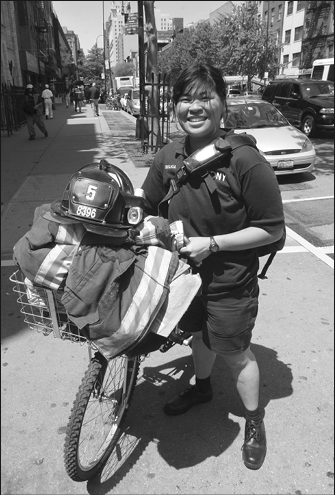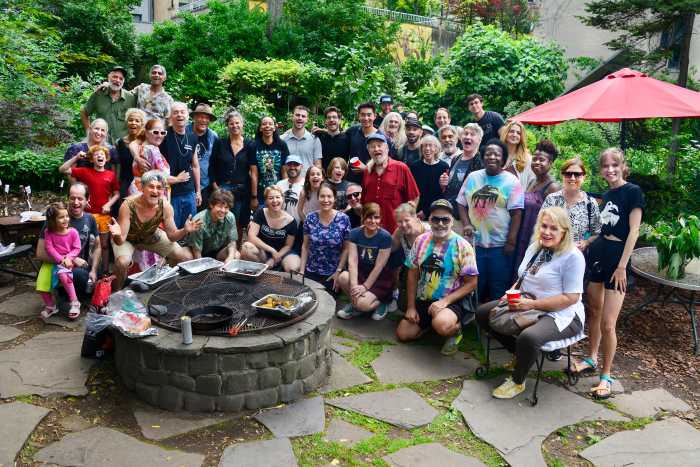By Lincoln Anderson
Sarinya Srisakul’s first two years as a New York City firefighter have been marked by tests of physical and emotional endurance, life-and-death situations — and a lot of getting soaking wet. Not from fire hoses, but from buckets of water tossed at her by her fellow firefighters at Engine 5 in the East Village.
During his or her first year on the job, a “probie,” or rookie firefighter, is regularly “bucketed” — drenched with water — when he or she least expects it. It helps keep firefighters on their toes, and is a kick for the bucketer, if not the bucketee.
“You don’t expect it and you just have to take it,” Srisakul said, noting it happened to her “too many times to count. We all get bucketed. If you’re not paying attention, you get bucketed.”
There are other ignominies of being a probie.
“You have to scrub the toilets and sweep the floor,” she said. “You have to do everything for a year.”
But Srisakul, 26, has taken it all in stride, along with the challenges of being the city’s first female Asian-American firefighter. Just being a female in the department is rare enough: Less than 1 percent of New York City firefighters are women.
The F.D.N.Y. has among the toughest requirements for females. While many fire departments around the country offer separate physical tests for women, in New York City they must pass the same tests
as the men. That probably explains why the city has fewer than 30 female firefighters.
“I had to train really hard,” Srisakul said. “I knew a lot of people don’t make it.” But she accepted the rigors of the physical trials without complaint. “To have a double-standard for the Fire Department, it wouldn’t be right,” she said. “I have to pull my own weight — or why would I be a firefighter?”
New firefighters are given a choice of where they’d like to be assigned. Srisakul’s first pick was Engine 5, on E. 14th St. at First Ave., since she always loved hanging out in the area.
“It’s like my stomping ground,” she said of the Village. Engine 5 is nicknamed “14th St. Express.” Their mascot is Godzilla.
“There was a fire in the 1980s,” Srisakul said, “and the little boy whose apartment the fire was in gave the company a Godzilla doll. Now people just give us Godzillas.”
The company’s shoulder patch shows Godzilla striding through the East Village.
A daughter of Thai immigrants, Srisakul grew up in Mt. Vernon, N.Y., and today lives in Woodside, Queens.
As a kid, unlike the stereotype of little boys playing with toy fire trucks, she never dreamed of being a firefighter. It wasn’t until she was 23 that she got the idea.
She had attended Parsons School of Design, originally planning to become an illustrator. But, after two and a half years, she became disillusioned with art school.
Discovering a new interest in activism, she got arrested protesting the police shooting of Amadou Diallo and spent a night in jail. She was mixed in with the general prison population.
“That was a life-changer for me,” she said. “Reality was staring me in the face. My friends at Parsons were doing drugs all the time. And these people were in jail for the same thing. I was like, ‘What am I doing in art school drawing pictures? For what?’”
The next semester, she dropped out of school. She became an organizer for the New York City AIDS Housing Network and the Asian and Pacific Islander Coalition on H.I.V. and AIDS. But after 9/11, nonprofit jobs dried up since all the funding was going to antiwar groups, according to Srisakul.
“I’m very critical of the nonprofit world,” she said. “A lot of the funding goes to what’s hot at that moment.”
Broke and without a job, she fell back on a passion of hers, bicycling. For two years before she became a firefighter, Srisakul was a bicycle messenger and also delivered food for Westville restaurant in Greenwich Village.
She also put her organizing skills back to work, becoming vice president of the New York Bike Messenger Foundation, an organization lobbying for bike messengers’ rights. Working with the state attorney general, they succeeded in getting messenger services to stop charging riders for use of NEXTEL radios, instead allowing them to put down a deposit. Working with the I.R.S., they changed bike messengers’ job description from “independent contractor” to “employee status.” The change of terms allows bike messengers to qualify for workers’ compensation, disability and unemployment benefits.
While messengering, Srisakul got interested in joining the Fire Department after a female friend tried, but failed, to make the San Francisco Fire Department.
“The thing that appealed to me most was that it was an equal-opportunity employer,” Srisakul said. “It didn’t matter what I looked like. It didn’t matter that I dropped out of school or that I was gay.”
The battery of physical tests was daunting. She had to climb stairs for five minutes at a rate of one step per second while wearing a 50-pound vest. She had to raise and climb up an extension ladder in 11 seconds. She had to drag a dummy and drag a hose, again within a set time. She had to carry 100 pounds up stairs. Firefighters’ bunker gear alone weighs about 60 pounds, not counting special tools they might have to lug.
Extra training and the support of the local female firefighters association helped Srisakul pass the grueling tests.
“Women have to do more, because we don’t have natural upper-body strength,” she said. “I lift weights, I do yoga and bike.”
There was a psychological test, as well, the standard one given to New York City police officers and prison guards. She was asked a series of questions, such as “Do you like to set fires?” and “Do you like to hurt animals?”
Not long after starting at Engine 5, she encountered the job’s grim realities. It would test whether she had the stomach for it.
“My first fire, the guy died — that was on 20th and Second,” she said. “He fell asleep smoking. I’ve been to a lot of calls where people died, but that was my first.”
As first responders, firefighters also deal with medical emergencies and traffic accidents.
“Another time, it was a friend of a friend who got hit by an S.U.V.,” Srisakul recalled of a cyclist they treated. “He was hurt pretty bad. He was delivering food. He broke his legs, punctured a lung and couldn’t breathe.
“Probably the worst call I ever went to — this woman got run over by a bus on First Ave. — across the street from Gristede’s on 17th St. She was 82. She was alive because of the pressure of the bus tire — and when you remove the tire….”
While Srisakul was learning the ropes of being a “smoke eater,” her co-workers were also grappling with something new — having a woman on their crew.
“Honestly, every time a firehouse gets a woman, they try to treat you like everyone else,” Srisakul said. “But obviously, it’s hard to do that. They were walking on eggshells around me. They didn’t know if they were going to say the wrong thing. But once I proved myself and they got to know me, it was O.K.”
One thing setting her apart, though, is she’s a vegan. So as the guys eat burgers for dinner, she’ll munch on a salad.
“But I’ll help cut the vegetables, do the dishes,” she said.
Her father is relieved Srisakul is no longer a bike messenger, feeling it was too dangerous. Still, she sometimes gets to enjoy a little biking on the job. When firefighters are temporarily posted to neighboring firehouses, they ride Engine 5’s detail bike back and forth.
However, while Srisakul used to participate in the monthly Critical Mass, she quit after making up her mind to join the F.D.N.Y. The threat of getting tickets, or even arrested, on the freewheeling anarchistic ride was “too risky” to her career as a city employee, she figured.
“I used to do Critical Mass a lot when Giuliani was mayor,” she said. “I stopped after the R.N.C.”
Srisakul realizes she’s breaking new ground by doing her physically and emotionally demanding job.
“I guess we’re all trailblazers, all the women,” she said of the F.D.N.Y.’s female members.
She often gets positive feedback from other women when the firefighters come “back into quarters” — arrive at the firehouse in their truck — after a run to a blaze or sometimes just to the supermarket. Mothers walking by with their young daughters, often coming from the Sol Goldman 14th St. Y next door, praise her for being a role model.
“They say, ‘Thanks for showing my daughter that it’s possible for women to do this job,’ ” she said.































